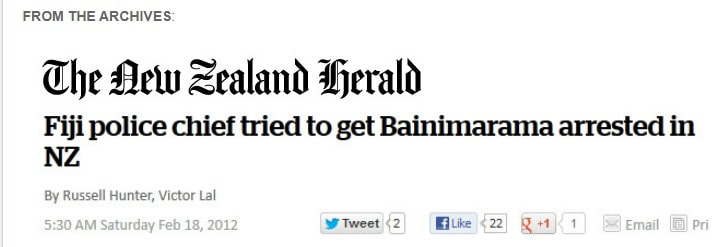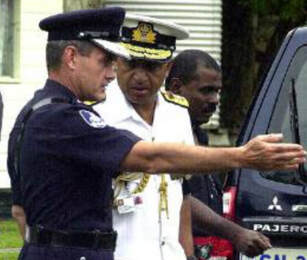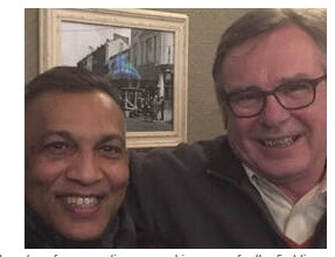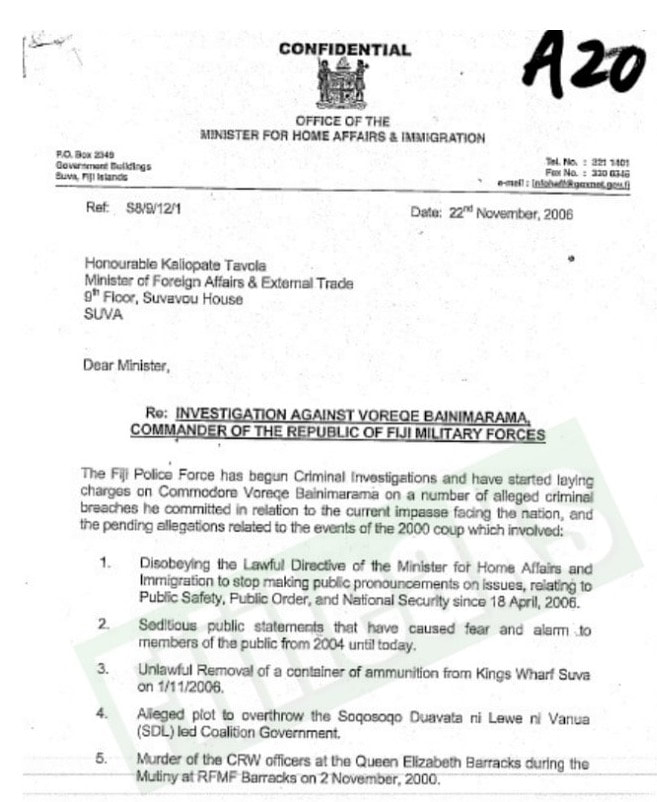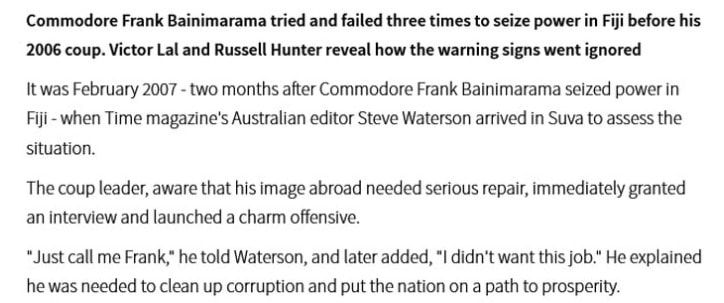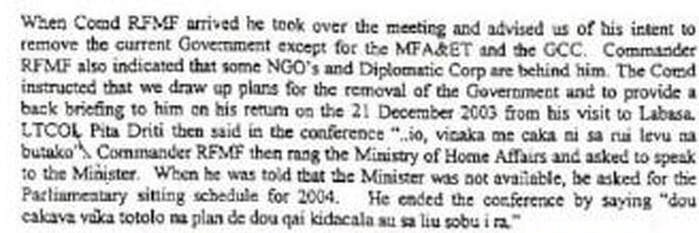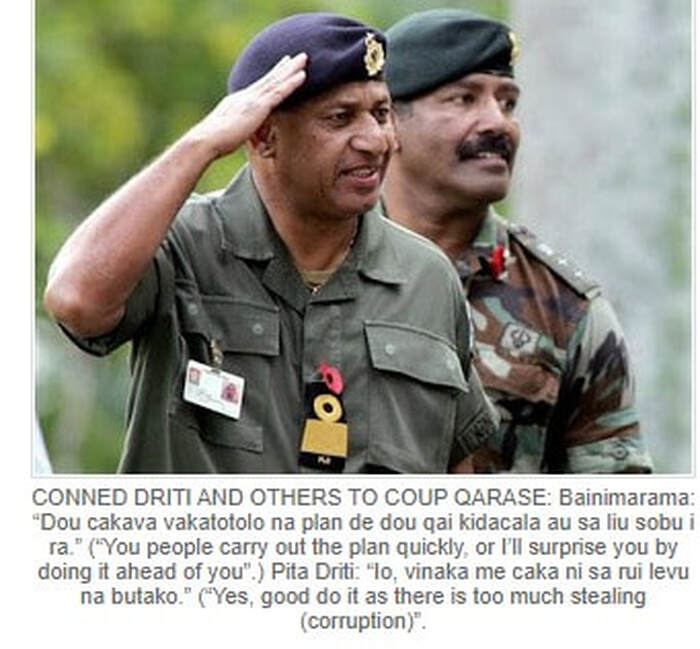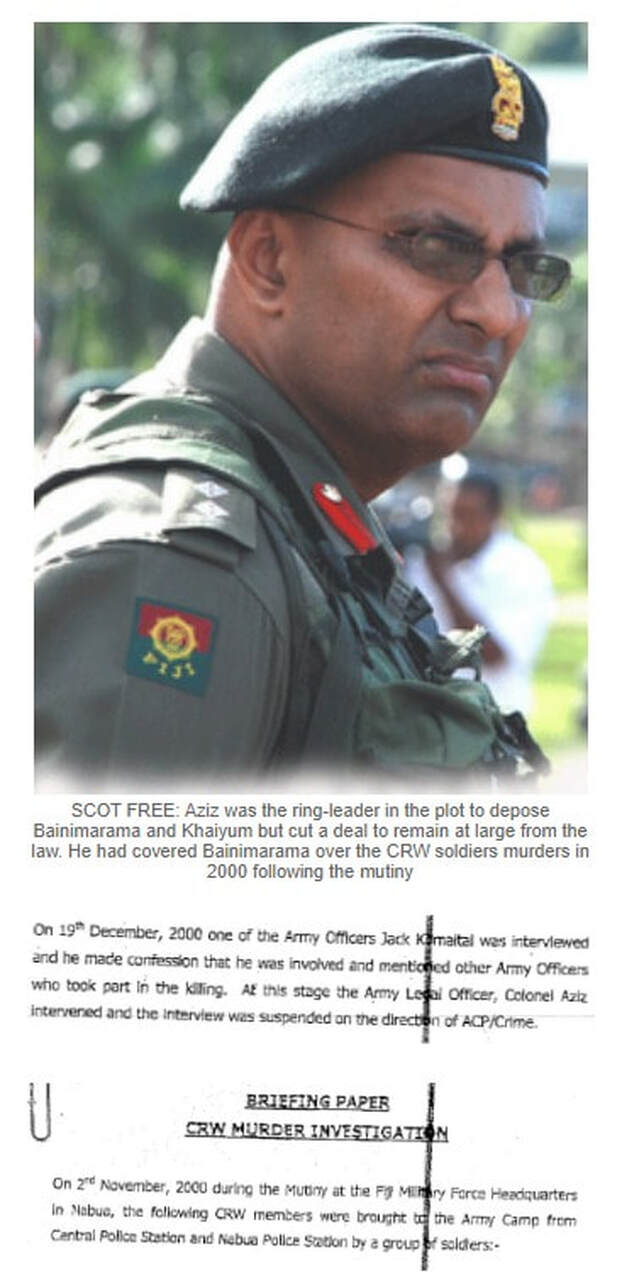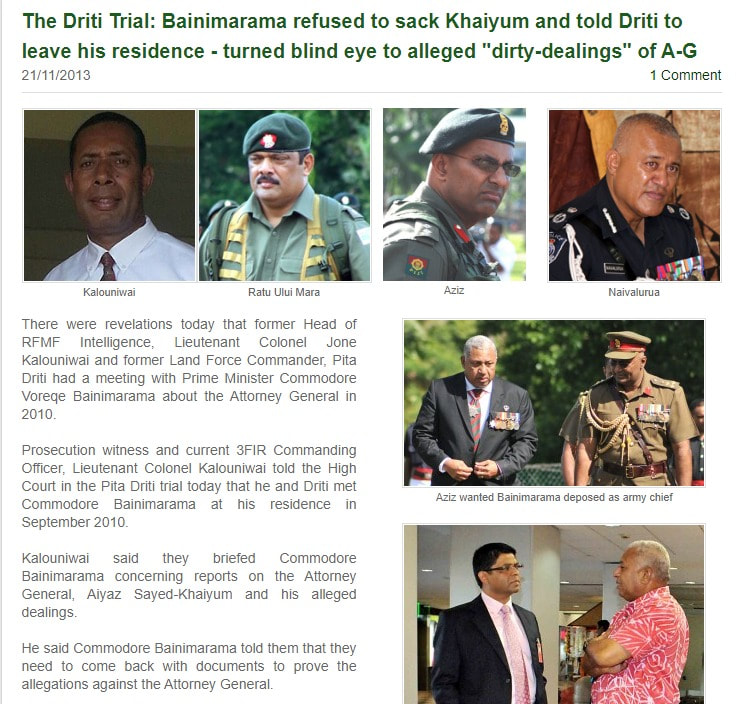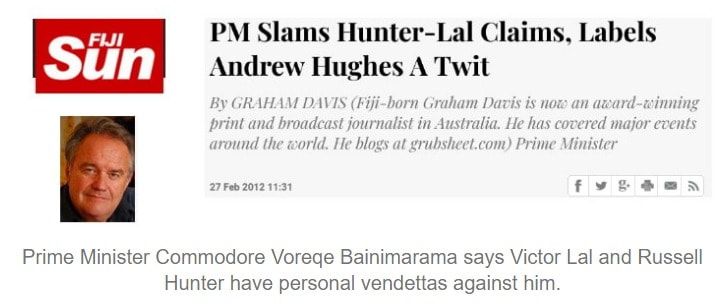*New Zealand legalised prostitution in brothels in 2003 and the capital city Wellington has made hay whilst the sun shines, currently offering several bordellos where you can pay for sex.
Both, the Fiji and overseas media, have not revealed the rapist's link to Frank Bainimarama. We may recall that there was a plan to arrest Bainimarama in New Zealand shortly before his 5 December 2006 coup when he flew into Wellington for his granddaughter's christening. More on that arrest story by Victor Lal and Russell Hunter (below) that was published in the New Zealand Herald, which has also run the rape story.
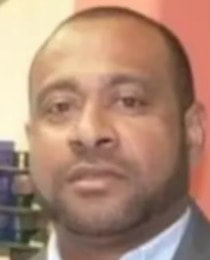
A former Army officer has been sentenced to four years in prison after raping a sex worker in Wellington. Savenaca Seruvatu was convicted of sexual violation by rape in the Wellington District Court in February, after removing a condom without consent during sexual intercourse in an adult entertainment club in Lower Hutt in September 2020. Seruvatu appeared in Wellington District Court, where Judge Ian Mill recounted the facts of the offending.
Seravatu had made a booking at TK’s Parlour to meet with a sex worker. “[He] made enquiries about having sex without a condom and we heard evidence both from the receptionist and also from [the victim] about that,” the court was told.
Judge Mill said Seruvatu offered the victim - a Wellington resident - $200 and a food grant to have sex without protection.
“She declined and explained to [Seruvatu] that there could not be penetrative sex without a condom, and, in fact, it is illegal for her to do so.”
The victim - who RNZ is calling Holly - said on trial that, during the sexual act, she "became aware that something was not right".
"She put a hand down and felt the condom had been removed," the judge said.
"Then she tensed herself and told [Seruvatu] several times to stop, but [he] continued to penetrate her for several minutes."
In his defence during trial, Seruvatu said the condom must have come off accidentally. However, the jury did not accept that, with Holly later finding the condom under the pillow on the bed where they had been having sex.
Judge Mill said the Court of Appeal referred to what had happened as a "deliberate, even cynical, breach of the parties' understanding of the basis on which consent was given". "So, there was a certain amount of premeditation in that case and in this case, Mr Seruvatu. You made enquiries. You were several times told what the rules were.
"You tried to offer incentives and, therefore, you were wanting to have unprotected sex, and, in the end, you decided to go ahead with that. So, there was some planning and premeditation," the judge said in court.
The judge said the impact on the victim was very significant and debilitating for her.
"Then there are the risks of unprotected sex. She was essentially having sexual intercourse with a stranger and the risks are obvious and those are the things, of course, that have made it so traumatic for her." During the trial, Seruvatu's defence said he did not use force during the time that the condom was off and stopped when requested by the victim.
Judge Mill disagreed.
"The evidence of Holly was that when she became aware, she tensed her body in a way that would make it difficult for you to have intercourse with her and she told you to stop.
"Not once, but several times, and that you continued and, of course, some force was needed to do that."
This was not a case of withdrawn consent, the judge said.
"It was a case that there never was consent to the act that constituted the rape.
"I also take into account the aggravating features of mental health to the victim and also exposing her to the risks associated with unprotected sex."
Starting again - victim In 2009,
Savenaca Seruvatu, then an army officer, was found guilty of sending a series of lewd texts to a woman captain at a military trial at Wellington's Trentham Army Base.
This time, his sentencing was reduced by 30 percent due to his service in the Fijian and the New Zealand Army, as well as his "distinguished contribution in the public health system".
Judge Mill said: "I think you are entitled to what I consider a generous discount for your previous good character, and then again for your contribution to society, both in the armed forces and outside of that."
Holly said the discount in the sentencing was discouraging.
"For him to get a discount for his military time kind of made me sick to my stomach."
She said the sentencing helped sent a message to other sex workers going through the same.
"It's a huge win for the [sex workers] community.
"For [the case] to actually go through court and for then to be a guilty verdict and then the sentence, I feel like it's actually really important. More sex workers should realise things like that shouldn't be a normality for us.
Holly said the process has taken a toll on her mental health.
"For the victim it doesn't really get any better, even after the sentencing, there's still quite a long journey for me to go and I am getting counselling, so hopefully that helps.
"I'm still living every day with anxiety; I'm still trying to reattach myself to society. It's not an easy process but it is a necessary one."
In her victim impact statement to court, Holly said she was trying to start anew.
"I had a home, a new job and a new life - but as our first trial drew closer, I began to break again. I still struggled to use the words to describe it, and it was easier to call it an attack because they wouldn't pity me as much. I began to withdraw again, using whatever I could to hide in my body and spiral and want to give up on life.
"I refused to leave my house, everywhere I looked I had flashbacks, and any hard work of coping strategies I developed has gone... These three years have been the longest and worst of my life, and I'm at the point of losing everything I have again.
"I'm hoping from today you begin to be a memory that I work through and move past, and through getting justice, I gained some power back."
'A victory for the industry' - sex workers' collective Aotearoa New Zealand Sex Workers' Collective Wellington regional coordinator Cherida Fraser was Holly's first point of contact after the crime.
"The worker involved came to me the day after it happened... and we liaised with our police liaison people to make sure she could speak to the police and report the crime," she said.
She said the case opened space for other workers to report crimes without the fear of not being believed due to their job.
"It's another powerful message to our sex work community that they are believed, that they do have access to justice and that they can get justice.
"I think there may be a perception out there that sex workers won't report or won't seek justice due to stigma, and I think sometimes the stigma of sex work continues to be exploited by people who don't think sex workers will report."
The sentencing sent a message to sex workers that they have access to justice like anybody else when these violations of consent happen, Fraser said.
"There's a lot of sexual violence that doesn't get through the justice system because it's very difficult for anybody who's the victim of sexual violence to speak about it.
"For sex workers, the stigma can be a barrier but that doesn't mean you should come forward. In this case, justice has been served." Source: RNZ, New Zealand Herald.
Seravatu had made a booking at TK’s Parlour to meet with a sex worker. “[He] made enquiries about having sex without a condom and we heard evidence both from the receptionist and also from [the victim] about that,” the court was told.
Judge Mill said Seruvatu offered the victim - a Wellington resident - $200 and a food grant to have sex without protection.
“She declined and explained to [Seruvatu] that there could not be penetrative sex without a condom, and, in fact, it is illegal for her to do so.”
The victim - who RNZ is calling Holly - said on trial that, during the sexual act, she "became aware that something was not right".
"She put a hand down and felt the condom had been removed," the judge said.
"Then she tensed herself and told [Seruvatu] several times to stop, but [he] continued to penetrate her for several minutes."
In his defence during trial, Seruvatu said the condom must have come off accidentally. However, the jury did not accept that, with Holly later finding the condom under the pillow on the bed where they had been having sex.
Judge Mill said the Court of Appeal referred to what had happened as a "deliberate, even cynical, breach of the parties' understanding of the basis on which consent was given". "So, there was a certain amount of premeditation in that case and in this case, Mr Seruvatu. You made enquiries. You were several times told what the rules were.
"You tried to offer incentives and, therefore, you were wanting to have unprotected sex, and, in the end, you decided to go ahead with that. So, there was some planning and premeditation," the judge said in court.
The judge said the impact on the victim was very significant and debilitating for her.
"Then there are the risks of unprotected sex. She was essentially having sexual intercourse with a stranger and the risks are obvious and those are the things, of course, that have made it so traumatic for her." During the trial, Seruvatu's defence said he did not use force during the time that the condom was off and stopped when requested by the victim.
Judge Mill disagreed.
"The evidence of Holly was that when she became aware, she tensed her body in a way that would make it difficult for you to have intercourse with her and she told you to stop.
"Not once, but several times, and that you continued and, of course, some force was needed to do that."
This was not a case of withdrawn consent, the judge said.
"It was a case that there never was consent to the act that constituted the rape.
"I also take into account the aggravating features of mental health to the victim and also exposing her to the risks associated with unprotected sex."
Starting again - victim In 2009,
Savenaca Seruvatu, then an army officer, was found guilty of sending a series of lewd texts to a woman captain at a military trial at Wellington's Trentham Army Base.
This time, his sentencing was reduced by 30 percent due to his service in the Fijian and the New Zealand Army, as well as his "distinguished contribution in the public health system".
Judge Mill said: "I think you are entitled to what I consider a generous discount for your previous good character, and then again for your contribution to society, both in the armed forces and outside of that."
Holly said the discount in the sentencing was discouraging.
"For him to get a discount for his military time kind of made me sick to my stomach."
She said the sentencing helped sent a message to other sex workers going through the same.
"It's a huge win for the [sex workers] community.
"For [the case] to actually go through court and for then to be a guilty verdict and then the sentence, I feel like it's actually really important. More sex workers should realise things like that shouldn't be a normality for us.
Holly said the process has taken a toll on her mental health.
"For the victim it doesn't really get any better, even after the sentencing, there's still quite a long journey for me to go and I am getting counselling, so hopefully that helps.
"I'm still living every day with anxiety; I'm still trying to reattach myself to society. It's not an easy process but it is a necessary one."
In her victim impact statement to court, Holly said she was trying to start anew.
"I had a home, a new job and a new life - but as our first trial drew closer, I began to break again. I still struggled to use the words to describe it, and it was easier to call it an attack because they wouldn't pity me as much. I began to withdraw again, using whatever I could to hide in my body and spiral and want to give up on life.
"I refused to leave my house, everywhere I looked I had flashbacks, and any hard work of coping strategies I developed has gone... These three years have been the longest and worst of my life, and I'm at the point of losing everything I have again.
"I'm hoping from today you begin to be a memory that I work through and move past, and through getting justice, I gained some power back."
'A victory for the industry' - sex workers' collective Aotearoa New Zealand Sex Workers' Collective Wellington regional coordinator Cherida Fraser was Holly's first point of contact after the crime.
"The worker involved came to me the day after it happened... and we liaised with our police liaison people to make sure she could speak to the police and report the crime," she said.
She said the case opened space for other workers to report crimes without the fear of not being believed due to their job.
"It's another powerful message to our sex work community that they are believed, that they do have access to justice and that they can get justice.
"I think there may be a perception out there that sex workers won't report or won't seek justice due to stigma, and I think sometimes the stigma of sex work continues to be exploited by people who don't think sex workers will report."
The sentencing sent a message to sex workers that they have access to justice like anybody else when these violations of consent happen, Fraser said.
"There's a lot of sexual violence that doesn't get through the justice system because it's very difficult for anybody who's the victim of sexual violence to speak about it.
"For sex workers, the stigma can be a barrier but that doesn't mean you should come forward. In this case, justice has been served." Source: RNZ, New Zealand Herald.
Fiji's chief of police made a private call to his New Zealand counterpart urging him to arrest Commodore Frank Bainimarama a few weeks before the military leader seized power in a coup in December 2006.
It was reported at the time that a request had been made through Interpol and rejected by the New Zealand Government but only now can details from behind the scenes be [re]vealed.
In November 2006 then Police Commissioner Howard Broad took the call from his Fiji counterpart Andrew Hughes, an Australian, who wanted to know if Commodore Bainimarama had committed any offence under New Zealand law for which he could be arrested.
Teams of police officers from both forces worked over a weekend and agreed the future dictator could be charged in New Zealand with perverting the course of justice in a foreign jurisdiction.
The planned charge related to remarks made by Commodore Bainimarama in New Zealand regarding an investigation into his alleged sedition in Fiji.
Mr Hughes sent two senior officers - an assistant commissioner and a senior detective - to New Zealand to liaise in the planned arrest.
"Then Howard Broad had a change of heart," said Mr Hughes. "He said New Zealand Foreign Affairs preferred a political solution.
"I argued it was his decision as Police Commissioner as to who should be charged in New Zealand."
At the time Commodore Bainimarama was in New Zealand for his granddaughter's christening and the Foreign Minister at the time, Winston Peters, had taken the opportunity to broker talks between him and elected Prime Minister Laisenia Qarase aimed at diverting Fiji's lurch towards a military takeover.
A day later, Mr Hughes received a call from Mr Broad.
"He sought my assurance that no NZ citizen would be endangered in Fiji as result of an arrest," said Mr Hughes.
"Of course I would do all in my power to protect all the people in Fiji but a blanket assurance of that kind was not possible. It would be like me asking him for a similar assurance covering all Fiji people in New Zealand. It wasn't possible to give him that.
"In the end, Mr Broad told me, 'Well, we're not going to arrest him."'
Mr Broad, now retired, told the Weekend Herald yesterday in a written statement that he remembered the call well.
"I remember it as a highly unusual request to consider an allegation against the Chief of Defence Force of a neighbouring country's properly constituted Government.
"I remember giving this decision a lot of consideration because it contained complex operational, legal and policy issues. I made the decision but I took a lot of advice. I remain comfortable with it."
He said some aspects of Mr Hughes' explanation did not accord with his recollection but he did not specify what they were.
In Suva, the Fiji police force had been awaiting an opportunity to arrest the commodore on the sedition charge but were unable to penetrate his heavily armed personal security detail - rarely less than 12-strong at any given time.
"I had earlier taken a brief of evidence to the DPP," said Mr Hughes, "and it was agreed that there was a case to answer on a sedition charge.
"We wanted to arrest and charge Commodore Bainimarama but he was permanently covered by heavy security. I was very keen to avoid an armed confrontation between the police and the military. So we waited."
As Prime Minister Qarase waited at Suva's Nausori airport to board a New Zealand Air Force VIP jet to take him to the Peters-brokered talks in Wellington, he was surprised to be joined by Mr Hughes, who then explained that the arrest plan was unlikely to come to fruition. Mr Qarase was shocked.
The Fiji Police Commissioner boarded the flight and in Wellington he met a deputy secretary for foreign affairs but was again told the New Zealand Government's position was that a political or diplomatic solution was preferred.
Aware that the police were ready to arrest him in Suva, Commodore Bainimarama had made it one of his many conditions for any settlement that the police commissioner would have to go.
Mr Hughes had, a week previously, sent his wife and sons to Australia having received credible information that they could be targeted by a military snatch squad.
In Wellington, he sought consular advice which was that he should not return to Fiji. He never did.
Mr Hughes also considered the safety of his own loyal officers who would try to protect him from military arrest.
The 2006 coup was the commodore's fourth attempt.
In 2000 during the negotiations that ended the Speight hostage crisis he suggested that the military should run the country for up to 50 years but Speight - and the president - would have none of it. In 2004 and again in 2005 he planned to take over the Government but his senior officers refused to commit treason.
All were sacked.
By December 2006 it was now or never for Commodore Bainimarama. It was widely agreed amongst informed observers of the events of 2006 in Fiji, including the diplomatic community, that without Commodore Bainimarama the RFMF would be rudderless.
Had Commodore Bainimarama been arrested in New Zealand the Fiji military would have been unable and unwilling to proceed with the removal of the Qarase Government.
The then US ambassador to Fiji, Larry Dinger, summed it up when he told his masters in Washington in a cable leaked by WikiLeaks regarding the New Zealand arrest plan.
"Being passive with bullies only encourages them. An arrest abroad might be the only way to enforce a criminal charge and remove the Bainimarama thorn," he reported.
Labour's foreign affairs spokesman Phil Goff, who did not deal with the issue, could not confirm Mr Hughes' account.
However, he could understand why no arrest was made, saying such a course of action would mean a country lost its credibility as a mediator for dealing with crises.
"I scarcely think you were going to lure a person here under false pretences only to arrest him. That would be seen as an ambush and bad faith and it wouldn't have resolved the situation within Fiji. "
It was reported at the time that a request had been made through Interpol and rejected by the New Zealand Government but only now can details from behind the scenes be [re]vealed.
In November 2006 then Police Commissioner Howard Broad took the call from his Fiji counterpart Andrew Hughes, an Australian, who wanted to know if Commodore Bainimarama had committed any offence under New Zealand law for which he could be arrested.
Teams of police officers from both forces worked over a weekend and agreed the future dictator could be charged in New Zealand with perverting the course of justice in a foreign jurisdiction.
The planned charge related to remarks made by Commodore Bainimarama in New Zealand regarding an investigation into his alleged sedition in Fiji.
Mr Hughes sent two senior officers - an assistant commissioner and a senior detective - to New Zealand to liaise in the planned arrest.
"Then Howard Broad had a change of heart," said Mr Hughes. "He said New Zealand Foreign Affairs preferred a political solution.
"I argued it was his decision as Police Commissioner as to who should be charged in New Zealand."
At the time Commodore Bainimarama was in New Zealand for his granddaughter's christening and the Foreign Minister at the time, Winston Peters, had taken the opportunity to broker talks between him and elected Prime Minister Laisenia Qarase aimed at diverting Fiji's lurch towards a military takeover.
A day later, Mr Hughes received a call from Mr Broad.
"He sought my assurance that no NZ citizen would be endangered in Fiji as result of an arrest," said Mr Hughes.
"Of course I would do all in my power to protect all the people in Fiji but a blanket assurance of that kind was not possible. It would be like me asking him for a similar assurance covering all Fiji people in New Zealand. It wasn't possible to give him that.
"In the end, Mr Broad told me, 'Well, we're not going to arrest him."'
Mr Broad, now retired, told the Weekend Herald yesterday in a written statement that he remembered the call well.
"I remember it as a highly unusual request to consider an allegation against the Chief of Defence Force of a neighbouring country's properly constituted Government.
"I remember giving this decision a lot of consideration because it contained complex operational, legal and policy issues. I made the decision but I took a lot of advice. I remain comfortable with it."
He said some aspects of Mr Hughes' explanation did not accord with his recollection but he did not specify what they were.
In Suva, the Fiji police force had been awaiting an opportunity to arrest the commodore on the sedition charge but were unable to penetrate his heavily armed personal security detail - rarely less than 12-strong at any given time.
"I had earlier taken a brief of evidence to the DPP," said Mr Hughes, "and it was agreed that there was a case to answer on a sedition charge.
"We wanted to arrest and charge Commodore Bainimarama but he was permanently covered by heavy security. I was very keen to avoid an armed confrontation between the police and the military. So we waited."
As Prime Minister Qarase waited at Suva's Nausori airport to board a New Zealand Air Force VIP jet to take him to the Peters-brokered talks in Wellington, he was surprised to be joined by Mr Hughes, who then explained that the arrest plan was unlikely to come to fruition. Mr Qarase was shocked.
The Fiji Police Commissioner boarded the flight and in Wellington he met a deputy secretary for foreign affairs but was again told the New Zealand Government's position was that a political or diplomatic solution was preferred.
Aware that the police were ready to arrest him in Suva, Commodore Bainimarama had made it one of his many conditions for any settlement that the police commissioner would have to go.
Mr Hughes had, a week previously, sent his wife and sons to Australia having received credible information that they could be targeted by a military snatch squad.
In Wellington, he sought consular advice which was that he should not return to Fiji. He never did.
Mr Hughes also considered the safety of his own loyal officers who would try to protect him from military arrest.
The 2006 coup was the commodore's fourth attempt.
In 2000 during the negotiations that ended the Speight hostage crisis he suggested that the military should run the country for up to 50 years but Speight - and the president - would have none of it. In 2004 and again in 2005 he planned to take over the Government but his senior officers refused to commit treason.
All were sacked.
By December 2006 it was now or never for Commodore Bainimarama. It was widely agreed amongst informed observers of the events of 2006 in Fiji, including the diplomatic community, that without Commodore Bainimarama the RFMF would be rudderless.
Had Commodore Bainimarama been arrested in New Zealand the Fiji military would have been unable and unwilling to proceed with the removal of the Qarase Government.
The then US ambassador to Fiji, Larry Dinger, summed it up when he told his masters in Washington in a cable leaked by WikiLeaks regarding the New Zealand arrest plan.
"Being passive with bullies only encourages them. An arrest abroad might be the only way to enforce a criminal charge and remove the Bainimarama thorn," he reported.
Labour's foreign affairs spokesman Phil Goff, who did not deal with the issue, could not confirm Mr Hughes' account.
However, he could understand why no arrest was made, saying such a course of action would mean a country lost its credibility as a mediator for dealing with crises.
"I scarcely think you were going to lure a person here under false pretences only to arrest him. That would be seen as an ambush and bad faith and it wouldn't have resolved the situation within Fiji. "
Fijileaks Founding Editor-in-Chief: We have on us scores of highly confidential files that were leaked to us from inside the RFMF High Command and the Laisenia Qarase government as dictator Frank Bainimarama began threatening to stage his 5 December 2006 Coup.
*Russell Hunter and our Founding Editor-in-Chief were completing a book on the 2006, including Speight's failed coup and the subsequent Bloody 2 November 2000 mutiny when Hunter suddenly died in Brisbane, Australia. We hope to complete the book, in Hunter's memory.
*In 2008, Hunter had been abducted from his Suva home in front of his family, detained, tortured and deported out of Fiji after our Founding Editor-in-Chief had revealed in the Fiji Sun that Bainimarama's then Interim Finance Minister and FLP leader Mahendra Pal Chaudhry was hiding Two Million Dollars in a Sydney bank account.
A series of documents smuggled out of Fiji tell a vastly different story. Bainimarama not only wanted the job but had tried three times previously to seize control of the nation.
His first attempt occurred during the negotiations to end the George Speight hostage crisis in August 2000. Several of those present confirmed that the Commodore - who had tacitly supported the Speight coup - declared that the military should lead the nation "for the next five, 10 or 50 years".
A heated argument between Speight and Bainimarama ensued, ending only when President Ratu Josefa Iloilo said a democratic solution was the only way forward.
Bainimarama proposed that banker and businessman Laisenia Qarase should lead an interim government with elections after one year. But to his frustration he found his "advice" to the interim government was routinely shunned.
By December 2003 the Qarase government - tired of the Commodore's constant and often public interference - was reluctant to renew his term, due to expire in April the following year.
When Bainimarama got wind of this, he flew into a rage and ordered his senior officers to start planning a coup. But he reckoned without senior officers who counselled against such action and finally refused to implement his orders.
On January 5, 2004, secret advice to Bainimarama not to stage a coup warned of the chaos and damage that could follow.
The document, composed and signed by Lieutenant Colonel Jeremaia Waqanisau, Colonel Alfred Tuatoko, Colonel George Kadavulevu, Colonel Samuela Raduva and naval commander Timoci Koroi, reads in part:
"We feel that the interests of the RFMF (Republic of Fiji Military Forces) and the nation have been overridden by your personal wishes ...
"Under the circumstances there is no way you can justify your intent and impending action. On the other hand the consequences of such action would be catastrophic for Fiji. The despair and suffering will be unbearable and longer lasting than that experienced after 1987 and 2000."
None of the officers agreed to be interviewed.
However, the later "redress of wrong petition" also contains a statement by Tuatoko, who wrote: "In my interview with [Bainimarama] he stated that he would forcefully remove the present government if his term as Comd RFMF was not renewed.
"I advised him that such an act was illegal and amounted to treason. I advised him that there are legal ways to settle his disagreement with government and that he must follow that legal path. Comd said that doing so would take too much time. He said that removing the government would be legally wrong but was morally correct."
This document was sent to the Minister for Home Affairs, Joketani Cokanasiga, and is likely to have been seen by Qarase. Incredibly, nothing was done. A senior minister told Hunter at the time: "We're not too worried about him [Bainimarama]. He doesn't have the support at the camp that he thinks he has."
The aborted coup of January 2004 persuaded the Government that the soldiers would not obey their commander if he ordered them to commit treason by removing it.
In December 2005, Bainimarama decided to try for a third time. He had been reappointed, so his job was no longer an issue, but he knew Police Commissioner Andrew Hughes had no intention of backing off a murder inquiry into the deaths of five members of the elite Counter Revolutionary Warfare unit, kicked to death by loyalist soldiers after the November 2000 mutiny.
There was also anger in sections of the officer corps (by now mostly hand-picked Bainimarama men) that the Qarase Government was "soft" on those involved in the 2000 coup.
Bainimarama had sacked the five officers who refused to carry out his first attempted coup and appointed Lieutenant Colonel Jone Baledrokadroka as Land Force Commander - effectively his deputy. He told Baledrokadroka to prepare plans for a military takeover.
Like his brother officers before him, JB (as he was known) refused to be involved in treason. He was told to take leave and not come back but again the coup had to be postponed.
JB told Hunter on the day of his dismissal: "I saw an order that I deciphered as treasonous and I could not accept it."
By May 2006, in the full realisation that Bainimarama's reappointment had not bought off its troublesome military commander and with a fresh election victory under its belt, the Cabinet wanted him gone.
There was talk of surcharging him for the blatant abuse of military funding in the army's "Truth and Justice" campaign that sought to influence voters during the 2006 election. It came to nothing - but Bainimarama was to hear of it and it fanned the flames of his fury.
With the dismissal of JB he was able to surround himself with an officer corps that owed their positions to him alone. His coup would take place within a year.
Claim strongman threatened to kill officer
Fiji leader Frank Bainimarama threatened to kill a former top army officer who challenged his 2003 coup plan, according to the officer's written testimony.
The late Lieutenant-Colonel Jeremaia Waqanisau refused to carry out the Commodore's coup order and took a new job as CEO at the Ministry of Home Affairs.
In a file note at the time he recalled in January 2004 the Commodore barged into Home Affairs Minister Joketani Cokanasiga's office with several bodyguards, accusing Waqanisau of raising an army against him.
"Bainimarama further said had it not been for the minister I would have been dead already, and next time the military came back to finish what they started he would personally lead [them] to town and make sure I would be the first to die.
"I told Bainimarama when he came down next time he should come alone, without his weapon and his armed body guards and then try to kill me. He became furious challenging me to a fight taking off his [weapon] and posing for a fight... I said I didn't want to fight him and he should go away. The minister was holding him back and eventually pushed him out the door."
His first attempt occurred during the negotiations to end the George Speight hostage crisis in August 2000. Several of those present confirmed that the Commodore - who had tacitly supported the Speight coup - declared that the military should lead the nation "for the next five, 10 or 50 years".
A heated argument between Speight and Bainimarama ensued, ending only when President Ratu Josefa Iloilo said a democratic solution was the only way forward.
Bainimarama proposed that banker and businessman Laisenia Qarase should lead an interim government with elections after one year. But to his frustration he found his "advice" to the interim government was routinely shunned.
By December 2003 the Qarase government - tired of the Commodore's constant and often public interference - was reluctant to renew his term, due to expire in April the following year.
When Bainimarama got wind of this, he flew into a rage and ordered his senior officers to start planning a coup. But he reckoned without senior officers who counselled against such action and finally refused to implement his orders.
On January 5, 2004, secret advice to Bainimarama not to stage a coup warned of the chaos and damage that could follow.
The document, composed and signed by Lieutenant Colonel Jeremaia Waqanisau, Colonel Alfred Tuatoko, Colonel George Kadavulevu, Colonel Samuela Raduva and naval commander Timoci Koroi, reads in part:
"We feel that the interests of the RFMF (Republic of Fiji Military Forces) and the nation have been overridden by your personal wishes ...
"Under the circumstances there is no way you can justify your intent and impending action. On the other hand the consequences of such action would be catastrophic for Fiji. The despair and suffering will be unbearable and longer lasting than that experienced after 1987 and 2000."
None of the officers agreed to be interviewed.
However, the later "redress of wrong petition" also contains a statement by Tuatoko, who wrote: "In my interview with [Bainimarama] he stated that he would forcefully remove the present government if his term as Comd RFMF was not renewed.
"I advised him that such an act was illegal and amounted to treason. I advised him that there are legal ways to settle his disagreement with government and that he must follow that legal path. Comd said that doing so would take too much time. He said that removing the government would be legally wrong but was morally correct."
This document was sent to the Minister for Home Affairs, Joketani Cokanasiga, and is likely to have been seen by Qarase. Incredibly, nothing was done. A senior minister told Hunter at the time: "We're not too worried about him [Bainimarama]. He doesn't have the support at the camp that he thinks he has."
The aborted coup of January 2004 persuaded the Government that the soldiers would not obey their commander if he ordered them to commit treason by removing it.
In December 2005, Bainimarama decided to try for a third time. He had been reappointed, so his job was no longer an issue, but he knew Police Commissioner Andrew Hughes had no intention of backing off a murder inquiry into the deaths of five members of the elite Counter Revolutionary Warfare unit, kicked to death by loyalist soldiers after the November 2000 mutiny.
There was also anger in sections of the officer corps (by now mostly hand-picked Bainimarama men) that the Qarase Government was "soft" on those involved in the 2000 coup.
Bainimarama had sacked the five officers who refused to carry out his first attempted coup and appointed Lieutenant Colonel Jone Baledrokadroka as Land Force Commander - effectively his deputy. He told Baledrokadroka to prepare plans for a military takeover.
Like his brother officers before him, JB (as he was known) refused to be involved in treason. He was told to take leave and not come back but again the coup had to be postponed.
JB told Hunter on the day of his dismissal: "I saw an order that I deciphered as treasonous and I could not accept it."
By May 2006, in the full realisation that Bainimarama's reappointment had not bought off its troublesome military commander and with a fresh election victory under its belt, the Cabinet wanted him gone.
There was talk of surcharging him for the blatant abuse of military funding in the army's "Truth and Justice" campaign that sought to influence voters during the 2006 election. It came to nothing - but Bainimarama was to hear of it and it fanned the flames of his fury.
With the dismissal of JB he was able to surround himself with an officer corps that owed their positions to him alone. His coup would take place within a year.
Claim strongman threatened to kill officer
Fiji leader Frank Bainimarama threatened to kill a former top army officer who challenged his 2003 coup plan, according to the officer's written testimony.
The late Lieutenant-Colonel Jeremaia Waqanisau refused to carry out the Commodore's coup order and took a new job as CEO at the Ministry of Home Affairs.
In a file note at the time he recalled in January 2004 the Commodore barged into Home Affairs Minister Joketani Cokanasiga's office with several bodyguards, accusing Waqanisau of raising an army against him.
"Bainimarama further said had it not been for the minister I would have been dead already, and next time the military came back to finish what they started he would personally lead [them] to town and make sure I would be the first to die.
"I told Bainimarama when he came down next time he should come alone, without his weapon and his armed body guards and then try to kill me. He became furious challenging me to a fight taking off his [weapon] and posing for a fight... I said I didn't want to fight him and he should go away. The minister was holding him back and eventually pushed him out the door."
When questioned by defence lawyer Filimoni Vosarogo, Kalouniwai revealed that they did not have any documents and did not have any intelligence on the Attorney General’s alleged dealings.
Kalouniwai said that the Prime Minister made it clear to them that he will not do anything unless he gets the information relating to the allegations.
He also said that Driti had told him to conduct the investigation about the Attorney General.
Kalouniwai then instructed his team to gather information about Aiyaz Sayed-Khaiyum.
He said the meeting ended abruptly with Commodore Bainimarama as they only had information from various blog sites.
While testifying in court today Driti also confirmed that they had met with Commodore Bainimarama in September 2010.
Driti said he briefed Commodore Bainimarama and asked for the removal of the Attorney General due to the alleged dealings.
He said Commodore Bainimarama told Driti and Kalouniwai and I quote “No, walk out” end of quote.
Driti said he was called back to Commodore Bainimarama’s residence on the following day.
Commodore Bainimarama, Brigadier General Ioane Naivalurua, Force Chaplain Major Tikinatabua and Ratu Tevita Mara were present in the meeting.
Bainimarama told Driti that he had received some information on the plan to overthrow him and the President when Bainimarama takes the trip to Sudan.
Commodore Bainimarama then told Driti to speak to Brigadier General Mohammed Aziz and take his overdue leave and remain at the quarters.
Bainimarama asked Driti to resign as Land Force Commander and as a commissioned officer after his leave comes to an end. Source: Fijivillage
Kalouniwai said that the Prime Minister made it clear to them that he will not do anything unless he gets the information relating to the allegations.
He also said that Driti had told him to conduct the investigation about the Attorney General.
Kalouniwai then instructed his team to gather information about Aiyaz Sayed-Khaiyum.
He said the meeting ended abruptly with Commodore Bainimarama as they only had information from various blog sites.
While testifying in court today Driti also confirmed that they had met with Commodore Bainimarama in September 2010.
Driti said he briefed Commodore Bainimarama and asked for the removal of the Attorney General due to the alleged dealings.
He said Commodore Bainimarama told Driti and Kalouniwai and I quote “No, walk out” end of quote.
Driti said he was called back to Commodore Bainimarama’s residence on the following day.
Commodore Bainimarama, Brigadier General Ioane Naivalurua, Force Chaplain Major Tikinatabua and Ratu Tevita Mara were present in the meeting.
Bainimarama told Driti that he had received some information on the plan to overthrow him and the President when Bainimarama takes the trip to Sudan.
Commodore Bainimarama then told Driti to speak to Brigadier General Mohammed Aziz and take his overdue leave and remain at the quarters.
Bainimarama asked Driti to resign as Land Force Commander and as a commissioned officer after his leave comes to an end. Source: Fijivillage
By GRAHAM DAVIS
(Fiji-born Graham Davis is now an award-winning print and broadcast journalist in Australia. He has covered major events around the world.
He blogs at grubsheet.com)
Prime Minister Commodore Voreqe Bainimarama has strongly denied claims made by two former Fiji journalists that he tried to mount three coups before his takeover in December 2006.
In two articles in the New Zealand Herald, the Oxford-based academic and author Victor Lal and Russell Hunter, the expelled former publisher and editor-in-chief of the Fiji Sun, said Commodore Bainimarama had tried to take over the country after the Speight coup in 2000, and then again in 2004 and 2005.
The latest article details what the authors say is leaked correspondence from some of Commodore Bainimarama’s fellow officers urging him not to proceed and warning that they would oppose him.
In an interview in Suva, Commodore Bainimarama said the allegations were “not true”.
In the case of 2000, Mr Lal and Mr Hunter reported that Commodore Bainimarama demanded the military should be given the authority to rule Fiji for 50 years but this was opposed by the then president, Ratu Josefa Iloilo.
ALREADY IN CONTROL
Denying the account, Commodore Bainimarama said he was already in control of Fiji in 2000. “For their information, I was in charge of the nation in 2000, so I took over in 2000. I gave the government to (Laisenia) Qarase”.
The Prime Minister said it was historical fact that he had handed the reins of power to Laisenia Qarase hoping that he would govern for all Fijians and not just the indigenous majority.
“Everyone knows the story of 2000 when I came in, so why they changed this and (have) people believing it, I don’t know”.
Commodore Bainimarama also denied subsequent attempts to seize government before his takeover in 2006.
He said: In 2004 and 2005, there was no intention then to remove the government because I was trying to tell the government to play ball.
“There was a build-up of animosity between us and the government of the day, but there was no intention then to remove them because I was trying to get them to change their stance on the Qoliqoli (coastal resources) Bill and the racism that was rife. I was trying to persuade Qarase that he was wrong but there was no talk of us wanting to do coups then.”
The Prime Minister also responded to the account by Mr Lal and Mr Hunter that the former Australian police chief in Fiji, Andrew Hughes, tried to persuade NZ police to arrest him during a visit there in the lead-up to the 2006 coup.
According to their report, Mr Hughes believed that comments made by Commodore Bainimarama during the visit constituted grounds for a NZ charge of perverting the course justice.
These comments related to an ongoing police investigation in Fiji into whether Commodore Bainimarama could be charged with sedition for threatening to overthrow the government of Laisenia Qarase. In the event, the New Zealanders refused to act, primarily because of fears for the safety of NZ citizens in Fiji if the arrest provoked a backlash in the military.
IGNORED THE HUGHES PLAN
The Fijian leader said he’d been aware at the time of the Hughes plan to have him arrested but had ignored it
.
“I didn’t think much of it because I think this guy is a twit. I mean, who would think of getting away with the arrest of a defence force chief in the Pacific, especially an Australian coming to arrest a commander of the Fiji Military Forces”, he said.
Noting that the then NZ Police chief, Howard Broad “had more sense” than Hughes to reject the request, Commodore Bainimarama said the arrest attempt “didn’t surprise him” and he believed that Andrew Hughes was acting on the instructions of the Australian Government.
“I have no doubt about that. The government of the day (Qarase’s SDL) were puppets in the hands of the Australians so Hughes was doing the bidding of both the Qarase government and the Australian Government”, he said.
The Fijian leader said the arrest attempt did not change his behaviour in any way. “We’d already made up our minds on what we were going to do and that was to remove Qarase,” he said.
PERSONAL VENDETTA
He also launched an attack on Mr Lal and Mr Hunter, claiming they were engaged in a personal vendetta against him.
“You should look at the writers. They are not credible people. Victor Lal runs down everyone in Fiji. So does Russell Hunter”.
The prime minister said Mr Hunter was motivated by anger that he’d been expelled from Fiji after 2006.
“He got the kick from here so obviously he will try and retaliate,” Commodore Bainimarama said.
(Fiji-born Graham Davis is now an award-winning print and broadcast journalist in Australia. He has covered major events around the world.
He blogs at grubsheet.com)
Prime Minister Commodore Voreqe Bainimarama has strongly denied claims made by two former Fiji journalists that he tried to mount three coups before his takeover in December 2006.
In two articles in the New Zealand Herald, the Oxford-based academic and author Victor Lal and Russell Hunter, the expelled former publisher and editor-in-chief of the Fiji Sun, said Commodore Bainimarama had tried to take over the country after the Speight coup in 2000, and then again in 2004 and 2005.
The latest article details what the authors say is leaked correspondence from some of Commodore Bainimarama’s fellow officers urging him not to proceed and warning that they would oppose him.
In an interview in Suva, Commodore Bainimarama said the allegations were “not true”.
In the case of 2000, Mr Lal and Mr Hunter reported that Commodore Bainimarama demanded the military should be given the authority to rule Fiji for 50 years but this was opposed by the then president, Ratu Josefa Iloilo.
ALREADY IN CONTROL
Denying the account, Commodore Bainimarama said he was already in control of Fiji in 2000. “For their information, I was in charge of the nation in 2000, so I took over in 2000. I gave the government to (Laisenia) Qarase”.
The Prime Minister said it was historical fact that he had handed the reins of power to Laisenia Qarase hoping that he would govern for all Fijians and not just the indigenous majority.
“Everyone knows the story of 2000 when I came in, so why they changed this and (have) people believing it, I don’t know”.
Commodore Bainimarama also denied subsequent attempts to seize government before his takeover in 2006.
He said: In 2004 and 2005, there was no intention then to remove the government because I was trying to tell the government to play ball.
“There was a build-up of animosity between us and the government of the day, but there was no intention then to remove them because I was trying to get them to change their stance on the Qoliqoli (coastal resources) Bill and the racism that was rife. I was trying to persuade Qarase that he was wrong but there was no talk of us wanting to do coups then.”
The Prime Minister also responded to the account by Mr Lal and Mr Hunter that the former Australian police chief in Fiji, Andrew Hughes, tried to persuade NZ police to arrest him during a visit there in the lead-up to the 2006 coup.
According to their report, Mr Hughes believed that comments made by Commodore Bainimarama during the visit constituted grounds for a NZ charge of perverting the course justice.
These comments related to an ongoing police investigation in Fiji into whether Commodore Bainimarama could be charged with sedition for threatening to overthrow the government of Laisenia Qarase. In the event, the New Zealanders refused to act, primarily because of fears for the safety of NZ citizens in Fiji if the arrest provoked a backlash in the military.
IGNORED THE HUGHES PLAN
The Fijian leader said he’d been aware at the time of the Hughes plan to have him arrested but had ignored it
.
“I didn’t think much of it because I think this guy is a twit. I mean, who would think of getting away with the arrest of a defence force chief in the Pacific, especially an Australian coming to arrest a commander of the Fiji Military Forces”, he said.
Noting that the then NZ Police chief, Howard Broad “had more sense” than Hughes to reject the request, Commodore Bainimarama said the arrest attempt “didn’t surprise him” and he believed that Andrew Hughes was acting on the instructions of the Australian Government.
“I have no doubt about that. The government of the day (Qarase’s SDL) were puppets in the hands of the Australians so Hughes was doing the bidding of both the Qarase government and the Australian Government”, he said.
The Fijian leader said the arrest attempt did not change his behaviour in any way. “We’d already made up our minds on what we were going to do and that was to remove Qarase,” he said.
PERSONAL VENDETTA
He also launched an attack on Mr Lal and Mr Hunter, claiming they were engaged in a personal vendetta against him.
“You should look at the writers. They are not credible people. Victor Lal runs down everyone in Fiji. So does Russell Hunter”.
The prime minister said Mr Hunter was motivated by anger that he’d been expelled from Fiji after 2006.
“He got the kick from here so obviously he will try and retaliate,” Commodore Bainimarama said.

